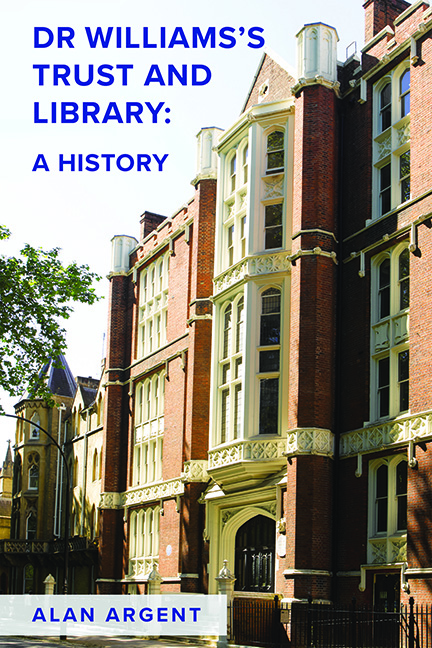Book contents
- Frontmatter
- Dedication
- Contents
- List of Illustrations
- Foreword
- Preface
- Abbreviations
- Notes on Dates, Money, Welsh Place Names and Publications
- Prologue
- 1 Dr Williams and His Will
- 2 Benjamin Sheppard, Receiver 1721–31: Faith, Fitness, and Diligence
- 3 Constructing the Library Building 1725–30: A Proper Plan
- 4 Francis Barkstead, Receiver 1731–47: Piety and Charity
- 5 John Cooper, Receiver 1748–62: Liberty and Liberal Dissent
- 6 Richard Jupp junior, Receiver 1762–95: A Very Respectable Body
- 7 Richard Webb Jupp, Receiver 1795–1850, and David Davison, Receiver 1850–7: Fashionable Sympathies Amid Increasing Light
- 8 Walter D. Jeremy, Receiver 1857–93: The Scrupulous Observer
- 9 Francis H. Jones, Secretary and Librarian 1886–1914: Introducing Order
- 10 Robert Travers Herford, Secretary and Librarian 1914–25: Application and Imagination
- 11 Stephen Kay Jones, Librarian 1925–46, and Joseph Worthington, Secretary 1925–44: A New Age with Old Strains
- 12 Roger Thomas, Secretary 1944–66 and Librarian 1946–66: Trusted Innovator
- 13 Kenneth Twinn, Secretary and Librarian 1966–76: Modest Dependability
- 14 John Creasey, Librarian, and James McClelland, Secretary, 1977–98: Mixed Blessings
- 15 David Wykes, Director 1998–2021: Past, Present, and Future
- 16 Dr Williams’s Trust: An Assessment
- Appendix 1 Trustees in 1723
- Appendix 2 Lists from Short Account (with later additions)
- Bibliography
- Index
Foreword
Published online by Cambridge University Press: 26 May 2022
- Frontmatter
- Dedication
- Contents
- List of Illustrations
- Foreword
- Preface
- Abbreviations
- Notes on Dates, Money, Welsh Place Names and Publications
- Prologue
- 1 Dr Williams and His Will
- 2 Benjamin Sheppard, Receiver 1721–31: Faith, Fitness, and Diligence
- 3 Constructing the Library Building 1725–30: A Proper Plan
- 4 Francis Barkstead, Receiver 1731–47: Piety and Charity
- 5 John Cooper, Receiver 1748–62: Liberty and Liberal Dissent
- 6 Richard Jupp junior, Receiver 1762–95: A Very Respectable Body
- 7 Richard Webb Jupp, Receiver 1795–1850, and David Davison, Receiver 1850–7: Fashionable Sympathies Amid Increasing Light
- 8 Walter D. Jeremy, Receiver 1857–93: The Scrupulous Observer
- 9 Francis H. Jones, Secretary and Librarian 1886–1914: Introducing Order
- 10 Robert Travers Herford, Secretary and Librarian 1914–25: Application and Imagination
- 11 Stephen Kay Jones, Librarian 1925–46, and Joseph Worthington, Secretary 1925–44: A New Age with Old Strains
- 12 Roger Thomas, Secretary 1944–66 and Librarian 1946–66: Trusted Innovator
- 13 Kenneth Twinn, Secretary and Librarian 1966–76: Modest Dependability
- 14 John Creasey, Librarian, and James McClelland, Secretary, 1977–98: Mixed Blessings
- 15 David Wykes, Director 1998–2021: Past, Present, and Future
- 16 Dr Williams’s Trust: An Assessment
- Appendix 1 Trustees in 1723
- Appendix 2 Lists from Short Account (with later additions)
- Bibliography
- Index
Summary
By the time of his death on 26 January 1716 Dr Daniel Williams was the most eminent of the English Protestant dissenters. Consulted by leading politicians, greatly respected as theologian and preacher, he deployed his financial astuteness to establish an enduring legacy for the benefit of his co-religionists. It was understandable that his primary concern was for the ministers of dissent, and the education of candidates for the dissenting ministry. It was essential to the future of the dissenting denominations that successive generations of educated ministers be provided for their congregations and academies. Having overcome hardships in his early life, Dr Williams made it his priority to serve his fellow ministers of religion and, in the words of his memorial plaque at the library, ‘to make their path to solid learning easier than he himself had found it’. That purpose he implemented through a bursary to be held at the university of Glasgow for ministerial candidates, through grants to individual dissenting ministers, and the establishment of the library which, more than three hundred years later, still bears his name.
Dr Williams's Library has been central to the history of Protestant dissent in Britain, and particularly to that of the Presbyterians, Congregationalists (or Independents, as they were usually known during the eighteenth century) and Baptists, who constituted the principal dissenting denominations. Its successive locations in London enabled it to become a repository for dissenting archives as well as a meeting place for inter-denominational co-operation. Subsequently, with very substantial increases of its holdings of rare printed books, important manuscript collections, and other primary documents, it acquired an international reputation as a major resource for the religious history of Britain. That reputation was consolidated by the foundation in 1947 of the Friends of Dr Williams's Library and the series of annual lectures, that it has sponsored (seventy-three by 2020), and by the numerous acknowledgements made in the prefaces of academic monographs that have drawn upon the library's collections. The three-hundredth anniversary of the death of its founder has provided further opportunities for reflection upon and consolidation of the history of the Dr Williams's Trust and Library. In this regard, Dr David L. Wykes, who served as Director of the trust and library from 1998 to 2021, has made a significant addition to the literature.
- Type
- Chapter
- Information
- Dr Williams's Trust and Library , pp. xi - xiiiPublisher: Boydell & BrewerPrint publication year: 2022



